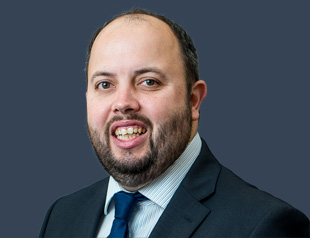- Swansea (Main)01792 773 773
- Caerphilly02920 860 628
- Cardiff02920 225 472
- Carmarthen01267 234 022
- Cowbridge01446 771 742
- Haverfordwest01437 764 723
- Rural Practice01267 266 944
- St Davids01348873671
- Please note that all phone calls are recorded
Court of Protection Disputes
The role of the Court of Protection is to safeguard the interests of people who lack the capacity to make financial and personal welfare decisions for themselves.
In some cases, disputes can arise regarding a vulnerable person's affairs - loved ones may not agree that the individual lacks mental capacity or they may disagree with choices made about their care.
Our experienced Court of Protection solicitors specialise in handling issues and disputes in the Court of Protection with sensitivity.
If you are involved in a dispute over the Court of Protection, seeking advice from our expert solicitors can help you come to a resolution that best meets the needs of your loved one.
-
- Sean Boucher
- Director & Head of Lifetime Planning - West Wales
-
- Richard Howells
- Director & Head of Inheritance and Trusts Disputes
-
- Tomas Davies
- Associate Solicitor - Inheritance and Trusts Disputes
Our Court of Protection disputes expertise
Disputes over mental capacity
Disputes over the loss of mental capacity typically involve disagreements regarding an individual's ability to make decisions about their own welfare, finances, or property.
The Court of Protection is responsible for safeguarding the interests of individuals who lack mental capacity, ensuring that decisions made on their behalf are in their best interests.
Disputes may arise when family members, healthcare professionals, or others disagree on the extent of a person's mental incapacity or the appropriateness of specific decisions.
If you disagree with a family member or medical professional about someone’s mental capacity, it is advisable to seek specialist advice from Court of Protection dispute solicitors and consider obtaining a professional opinion before getting involved in court proceedings.
Objections to the registration of a Power of Attorney or Deputy
Objections to the registration of a Power of Attorney or Deputy often stem from concerns about the appropriateness of the appointed authority.
Family members may contest a registration if they disagree with the choices of the appointed attorney or deputy, or if they believe they are not acting in the best interests of the individual lacking capacity.
The Court of Protection will assess these objections to make sure the appointed attorney is acting in the best interests of your loved one.
Revoking a power of attorney
Revoking a power of attorney is the legal act of cancelling or withdrawing the authority granted to an appointed individual (the attorney) to make decisions on behalf of someone deemed mentally incapacitated.
This can occur for various reasons, such as changes in the incapacitated person's preferences, concerns about the attorney's competence, or suspicions of abuse or maladministration.
The process typically requires a formal application to the Court of Protection. The court will review the evidence and consider the best interests of the incapacitated person.
If you have concerns that a relative or friend is being taken advantage of by their Power of Attorney, it is advisable to gather evidence and seek advice from a specialist Court of Protection dispute lawyer before making an application to the Court of Protection.
Challenging gifts
Challenging gifts means contesting or questioning the validity of gifts made by someone lacking mental capacity or someone on their behalf.
Concerns may arise when gifts, be they financial or property-related, are made by the incapacitated person or on their behalf.
Challenging a gift often involves legal proceedings to assess whether the individual had the mental capacity to make such decisions at the time of the gift, and if external influences or undue pressure were involved.
This legal process aims to safeguard the vulnerable person's assets and ensure that any gifts align with their best interests.
Objecting to a proposed statutory Will
Disputes over a statutory Will involve objecting to the creation or alteration of a Will on behalf of an individual lacking mental capacity.
The Court of Protection may consider such applications to ensure that the Will accurately reflects the person's current wishes and is not a conflict of interest.
Objecting parties typically present evidence challenging the proposed provisions, citing concerns about the individual's capacity at the time of the Will's creation, potential undue influence, or errors in the document.
The court will evaluate these objections to determine the appropriateness of the statutory Will.
Challenging a personal welfare decision
Challenging personal welfare decisions means contesting choices made on behalf of individuals deemed mentally incapacitated.
Challenges to personal welfare decisions can arise when there are concerns about the appropriateness of choices related to healthcare, living arrangements, or other personal matters.
Objectors may argue that the decisions do not align with the incapacitated person's best interests or that the decision-making process was flawed.
Being able to challenge personal welfare decisions is important to safeguard the rights and well-being of those unable to make such choices independently.
Why choose our family law solicitors for Court of Protection advice?
At JCP Solicitors, our specialist team is committed to assisting clients under the protection of the court. Led by Director and Professional Deputy Lynne Morgan, an esteemed expert in the Court of Protection, the team has two dedicated Solicitors, two Legal Advisors, and seven Legal Assistants.
We provide support to individuals who have lost mental capacity due to catastrophic injury, dementia, illness, or disease. Currently, our full-time Court of Protection specialists are entrusted to act on an ongoing basis for a substantial number of clients, with a total combined asset value of approximately £110 million.
Get in touch with our Court of Protection disputes solicitors today.
For further information, please get in touch with our Inheritance and Trusts Disputes Solicitors in South Wales. You can give us a call at one of our local branches in Swansea, Caerphilly, Cardiff, Carmarthen, Cowbridge, Haverfordwest and St Davids.
Alternatively, please feel free to email us at law@jcpsolicitors.co.uk or fill in our online enquiry form.



